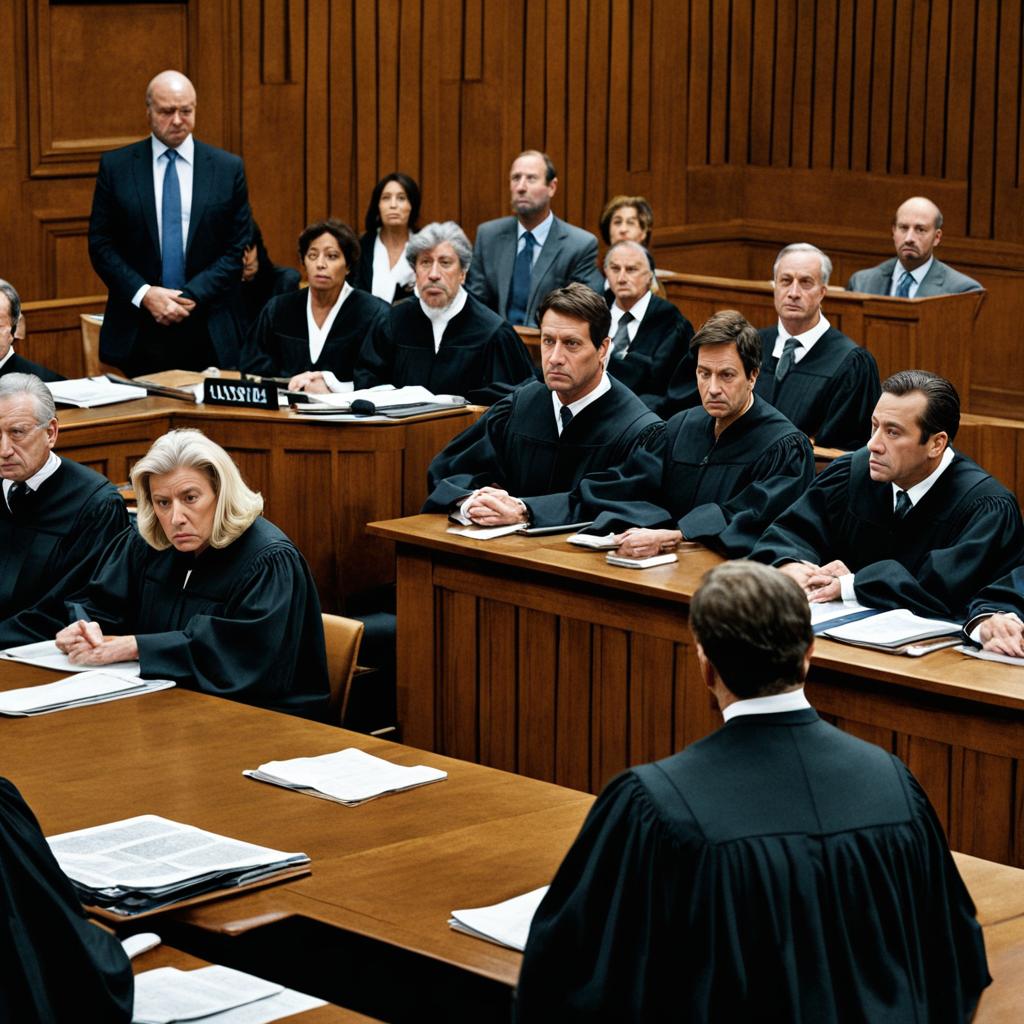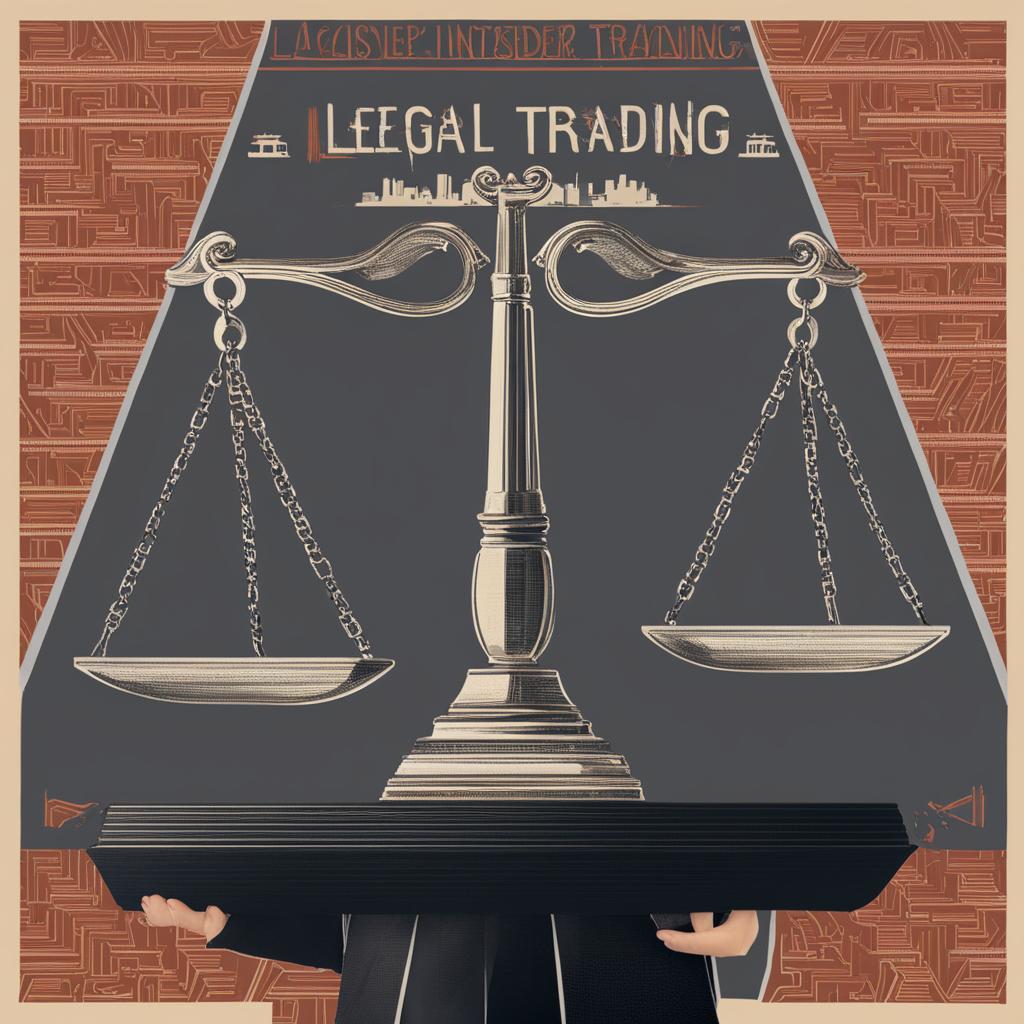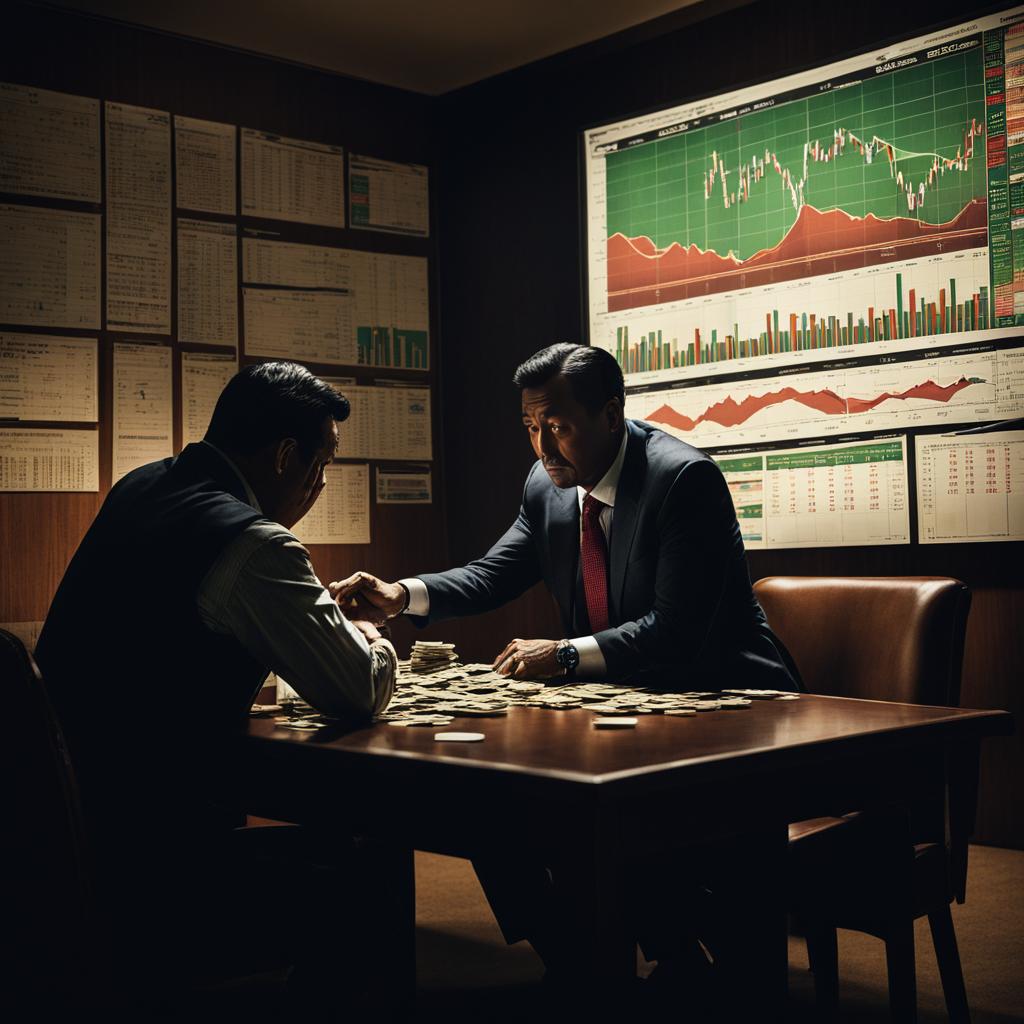Insider trading refers to the buying or selling of a publicly traded company’s stock or securities by someone who possesses non-public, material information about the company. While not all insider trading is illegal, it becomes illegal when insiders share this privileged information with others who then use it for personal gain. To ensure a fair and trustworthy marketplace, it is crucial to understand the definition of insider trading, the laws and regulations surrounding it, and how to avoid engaging in such activities.
Insider trading laws exist to protect investors and maintain market integrity. The Securities and Exchange Commission (SEC) in the United States monitors trading activity to detect and prevent insider trading. Violations of insider trading laws can result in severe penalties, including fines, imprisonment, and damage to one’s reputation and professional career.
To avoid engaging in insider trading, individuals and organizations must take proactive measures. This includes conducting thorough due diligence, defining sensitive non-public information, refraining from disclosing such information to outsiders, and promptly reporting any concerns or suspicions of insider trading to the appropriate authorities.
Key Takeaways:
- Insider trading involves the buying or selling of securities based on non-public, material information about a company.
- Not all insider trading is illegal, but it becomes illegal when insiders share privileged information for personal gain.
- The SEC monitors trading activity to detect and prevent insider trading.
- To avoid engaging in insider trading, individuals and organizations should conduct due diligence, define sensitive information, refrain from disclosing it, and report any concerns.
- Engaging in insider trading can lead to severe penalties, including fines, imprisonment, and reputational damage.
How Regulators Prevent Insider Trading
Regulators, such as the SEC, employ various strategies to prevent and detect insider trading. They prioritize monitoring trading activity, especially during critical events like earnings announcements and acquisitions. By keeping a close eye on trading patterns, regulators can identify large and irregular trades that may indicate the use of inside information.
Complaints from traders who experience significant losses on large trades can also trigger investigations into potential insider trading. Regulators take these complaints seriously and thoroughly examine the circumstances surrounding the trades to determine if any illegal activities occurred.
Whistleblowers, individuals with knowledge of trades made based on material nonpublic information, play a crucial role in helping regulators uncover instances of insider trading. Their reports and cooperation provide valuable insights and evidence for investigations, helping to bring perpetrators to justice.
Overall, the SEC and other regulatory bodies are committed to maintaining the integrity of financial markets and protecting investors. Their proactive measures, including monitoring trading activity, responding to complaints, and leveraging the assistance of whistleblowers, help to prevent and deter insider trading.
Insider Trading Prevention Strategies
| Strategy | Description |
|---|---|
| Monitoring Trading Activity | Regulators closely monitor trading patterns and look out for suspicious activity. |
| Complaint Investigations | Regulators thoroughly examine complaints from traders who suspect insider trading. |
| Whistleblower Cooperation | Regulators rely on information from whistleblowers to uncover instances of insider trading. |
How Companies Prevent Insider Trading
Companies take proactive steps to prevent insider trading within their organizations. One measure is implementing blackout periods, during which officers, directors, and other designated individuals are prohibited from trading the company’s securities.
Clearances from the company’s chief legal officer may be required for officers, directors, and others to ensure compliance with securities laws. These clearances help verify that trades are conducted within legal boundaries and prevent any potential misuse of inside information.
Educational programs are also implemented to educate employees about insider trading and the importance of not disclosing material nonpublic information to outsiders. By providing comprehensive training, companies empower their employees with knowledge and awareness to recognize and prevent insider trading.
Implementing blackout periods, obtaining clearance from the legal officer, and conducting educational programs are essential measures that companies undertake to prevent insider trading.
Blackout Periods
Blackout periods are designated periods of time when insiders are prohibited from trading the company’s securities. During these periods, individuals who have access to sensitive information are temporarily restricted from buying or selling stocks to prevent any potential misuse of insider knowledge. Blackout periods typically coincide with significant corporate events such as earnings releases, mergers, or acquisitions. By enforcing blackout periods, companies create a level playing field for investors and ensure fairness in the trading process.
Clearance from the Legal Officer
Clearances from the company’s chief legal officer serve as an additional layer of compliance to prevent insider trading. Officers, directors, and other designated individuals must seek clearance before conducting any trades to ensure compliance with securities laws. The legal officer reviews trading requests, assesses potential risks, and verifies that the trades are conducted within legal boundaries. This clearance process helps maintain transparency and accountability within the organization.
Educational Programs
Education plays a critical role in the prevention of insider trading. Companies provide educational programs to employees to raise awareness about insider trading regulations, the consequences of violating those regulations, and the importance of safeguarding material nonpublic information. These programs equip employees with knowledge and tools to identify potential insider trading situations and report any suspicious activities. By promoting a culture of compliance and ethics, companies create a strong foundation for preventing insider trading.
| Company Measures Against Insider Trading | Implementation |
|---|---|
| Blackout Periods | Designating specific periods when insiders are prohibited from trading securities. |
| Clearance from the Legal Officer | Obtaining approval from the company’s chief legal officer for insider trades. |
| Educational Programs | Conducting training sessions to educate employees about insider trading and its implications. |
Strategies to Reduce the Risk of Insider Trading
To reduce the risk of insider trading, I recommend implementing several strategies. Conducting thorough due diligence is key to identifying any red flags or unethical behaviors in potential and existing employees and suppliers.
Additionally, taking extra care outside of the office is crucial. Whether attending social events or trade gatherings, it is important to avoid engaging in discussions about sensitive or off-limits topics that could inadvertently lead to insider trading.
Defining what constitutes sensitive non-public information is another essential step. Clearly outlining the boundaries and ensuring that this information is not disclosed to outsiders helps minimize the risk of insider trading.
Furthermore, it is imperative to refrain from recommending or inducing others based on inside information. Promoting a culture of ethical behavior and promptly reporting any concerns are critical components in reducing the risk of insider trading.
Strategies to Reduce Insider Trading Risk:
- Conduct thorough due diligence on employees and suppliers
- Exercise caution in social and trade events
- Define sensitive non-public information and avoid disclosure to outsiders
- Refrain from recommending or inducing others based on inside information
- Promptly report any concerns
“To prevent insider trading, individuals and companies must be proactive in mitigating the risks associated with this illegal activity. By implementing effective strategies, such as due diligence and strict information control, we can protect ourselves and the integrity of the financial markets.”

| Strategies | Benefits |
|---|---|
| Conducting due diligence | Identifying red flags and unethical behaviors |
| Taking extra care outside of the office | Avoiding discussions about sensitive information |
| Defining sensitive non-public information | Minimizing the risk of accidental disclosure |
| Avoiding disclosure to outsiders | Maintaining the confidentiality of sensitive information |
| Refraining from recommending or inducing others based on inside information | Preventing unlawful trading activities |
| Promptly reporting concerns | Ensuring timely investigation and resolution |
Notable UK Insider Trading Cases
The UK has been witness to several high-profile insider trading cases, resulting in severe penalties for those found guilty. Let’s delve into some of these noteworthy cases:
A former Goldman Sachs analyst
In a prominent case, a former Goldman Sachs analyst was charged with insider dealing and fraud. This individual made trades based on material non-public information, which is illegal. The repercussions were severe, highlighting the seriousness with which the UK authorities treat insider trading.
Individuals involved in Arm Holdings and Punch Taverns
Another notable case involves individuals accused of insider dealing in the shares of Arm Holdings and Punch Taverns. Additionally, these individuals faced charges related to fraud involving loans taken out from Tesco Bank. These cases demonstrate that insider trading is taken seriously across various sectors in the UK.
Affiliates of Deutsche Bank
A case involving individuals connected to Deutsche Bank further emphasizes the consequences of insider trading. These individuals were found guilty of insider dealing and were sentenced to prison. Their crime involved passing inside information to accomplices who traded on their behalf, perpetuating the illicit use of confidential information.
These cases in the UK underscore the seriousness of insider trading and the commitment to prosecute those involved. The penalties imposed serve as a deterrent, signaling that insider trading is not only unethical but also illegal and punishable under the law.

Understanding Insider Trading – Legal vs. Illegal
Insider trading can be categorized as either legal or illegal. Legal insider trading occurs when insiders, such as company directors or executives, trade their company’s securities but comply with SEC regulations by reporting their transactions. This transparency ensures that the public is aware of the insider’s trades and can evaluate any potential conflicts of interest.
Illegal insider trading, on the other hand, involves trading based on material, non-public information and failing to disclose those transactions to the SEC. This type of insider trading gives individuals an unfair advantage and undermines the integrity of the financial markets. To combat this illegal activity, the Securities Exchange Act of 1934 requires insiders to file specific forms with the SEC to ensure transparency in their trading activities.
By differentiating between legal and illegal insider trading, regulators aim to maintain a fair and transparent marketplace where all investors have equal opportunities and access to information. It is crucial for individuals and companies to understand the distinction and comply with SEC regulations to promote trust and integrity in the financial industry.

Key Takeaways:
- Legal insider trading involves insiders trading their company’s securities but complying with SEC regulations by reporting their transactions.
- Illegal insider trading involves trading based on material, non-public information without disclosing those transactions to the SEC.
- The Securities Exchange Act of 1934 requires insiders to file specific forms with the SEC to ensure transparency in their trading activities.
Examples of Insider Trading
Recent years have witnessed notable cases of insider trading, demonstrating the severe consequences and negative impact of engaging in such illegal activities. Two prominent examples that garnered significant attention include the Martha Stewart case and the Amazon case.
Martha Stewart Case:
Martha Stewart, a well-known businesswoman and television personality, was charged with insider trading in 2001. The case revolved around Stewart’s sale of shares of ImClone Systems, a biopharmaceutical company, based on non-public information she received about an impending approval rejection from the Food and Drug Administration. Stewart and her broker, Peter Bacanovic, faced accusations of securities fraud, obstruction of justice, and making false statements.
Amazon Case:
In a more recent example, a former financial analyst at Amazon engaged in insider trading by sharing confidential information with an associate. The analyst disclosed non-public details about the company’s earnings, allowing the associate to make illegal trades based on this information. This case demonstrates the significant consequences and potential harm caused by insider trading, not only to the individuals involved but also to the integrity of the financial markets.
These examples serve as reminders of the importance of upholding ethical standards and abiding by the law in financial transactions. Insider trading undermines trust and fairness within the market, compromising the integrity of investing and trading for all participants.

| Insider Trading Case | Details |
|---|---|
| Martha Stewart | Charged with insider trading for selling shares based on non-public information from ImClone Systems. |
| Amazon Analyst | Involved in sharing confidential earnings information that led to illegal trading. |
Insider Trading Connotations
Insider trading carries a significant connotation that evokes negative sentiments within the financial community. The perception surrounding this practice revolves around the unfair advantage it grants individuals, particularly over average investors. The belief is that those engaging in insider trading, utilizing non-public information, have an unfair edge in the market, compromising the integrity of the financial system. This perception is further reinforced by the fact that insider trading is illegal in most jurisdictions, with severe penalties imposed on violators.
Regulators and governing bodies, such as the Securities and Exchange Commission (SEC), place high importance on preventing and penalizing insider trading to maintain a fair and transparent marketplace. By enforcing strict regulations and surveillance measures, regulators aim to minimize the impact of insider trading and protect the interests of all investors.
Having available historical data and comprehensive regulatory frameworks facilitates the identification and prosecution of insider trading activities, contributing to the overall confidence in the financial markets.
Insider Trading Connotations in Popular Culture
Insider trading has also permeated popular culture, often portrayed in movies and television shows as a shady and unethical practice. These portrayals further solidify the negative perception of insider trading in the minds of the general public.
“Insider trading is a black eye on the financial industry. But let’s not exaggerate its overall importance in comparison to other abuses like excessive executive compensation or self-dealing by certain corporate directors.” – Gary Weiss
| Pros | Cons |
|---|---|
| Protects the rights of average investors | Undermines market fairness |
| Prevents abuse of privileged information | Can lead to reputation damage for individuals and companies involved |
| Encourages transparency and accountability | May result in substantial financial penalties and imprisonment |
When Is Insider Trading Illegal?
Insider trading becomes illegal when it involves the use of material non-public information that can substantially impact a company’s stock price. Engaging in illegal insider trading carries severe penalties, including fines and potential imprisonment. To ensure a level playing field for all investors, it is essential to refrain from trading on non-public information or sharing such information with others.
When Is Insider Trading Legal?
Insider trading can be a complex topic, with legal and illegal actions intertwined. However, there are instances when insider trading is legal and complies with SEC regulations.
Insiders, such as company directors or executives, are allowed to trade their company’s securities as long as they follow specific guidelines and report their transactions to the SEC within the designated timeframes. This reporting requirement ensures transparency and accountability in insider trading activities.
By adhering to SEC regulations, insiders can engage in lawful insider transactions without facing legal consequences or compromising the integrity of the market.
It’s important to note that even though these transactions are legal, insiders must still exercise caution and avoid any appearance of impropriety. They should always act in the best interests of the company and its shareholders.
Benefits of Legal Insider Trading
Legal insider trading, when conducted responsibly, can have several positive implications:
- Insiders can demonstrate confidence in the company by buying its stock, which may enhance investor trust.
- These transactions can provide important signals to the market about the company’s prospects and performance.
- Insiders can diversify their investment portfolios without violating any laws or regulations.
It is crucial, however, for insiders to remain aware of and comply with SEC regulations to maintain the legality and ethical nature of these transactions.
Now that we understand when insider trading is legal, let’s explore some notable examples of insider trading in the next section.
| Legal Insider Trading | Illegal Insider Trading |
|---|---|
| Complies with SEC regulations | Violates SEC regulations |
| Insiders report transactions to the SEC | Transactions are not disclosed to the SEC |
| Can enhance investor confidence and market transparency | Undermines market integrity and fairness |
Insider Trading Prevention Measures
To prevent insider trading, it is crucial for individuals and companies to prioritize compliance with regulations and reporting obligations. By adhering to these requirements, we can effectively mitigate the risk of engaging in illegal insider trading.
Compliance with regulations ensures that we operate within the boundaries set by authorities to maintain a fair and transparent marketplace. It is essential to familiarize ourselves with the definition of material non-public information to make informed decisions about our trades. By abstaining from engaging in trades based on such information, we uphold integrity in our dealings.
Transparency plays a key role in preventing insider trading. By adhering to reporting obligations, we provide regulators with crucial information about our trading activities. This allows them to monitor and investigate any suspicious transactions, ensuring the market remains free from manipulation.
The Importance of Compliance
Compliance with insider trading regulations is not just a legal obligation; it is an ethical responsibility. Engaging in insider trading undermines the integrity of the market and erodes investors’ trust. By prioritizing compliance, we protect our reputation and demonstrate our commitment to maintaining a fair and level playing field for all market participants.
Adhering to reporting requirements and practicing transparency significantly reduce the risk of engaging in illegal insider trading.
It is essential to integrate insider trading prevention measures into our organizational culture and educate employees about the significance of compliance. By fostering a culture of integrity and accountability, we create an environment where everyone understands their reporting obligations and the consequences of non-compliance.
Best Practices for Insider Trading Prevention
Here are some best practices individuals and companies can follow to prevent insider trading:
- Regularly review and update internal policies and procedures related to trading and the handling of material non-public information.
- Conduct training programs to educate employees about insider trading regulations and the importance of compliance.
- Establish clear guidelines for employees regarding trading blackout periods, preclearance requirements, and the handling of sensitive information.
- Implement robust systems and controls to monitor and detect potential instances of insider trading.
- Encourage employees to report any suspicious activities or concerns through confidential reporting mechanisms.
- Foster a culture of transparency and ethical behavior, where employees feel comfortable raising questions or concerns about potential insider trading.
Summary of Insider Trading Risks and Compliance
Insider trading poses significant risks to both individuals and companies. Engaging in illegal insider trading can have severe consequences, including financial losses, reputational damage, and legal penalties. To mitigate these risks, it is essential to implement effective compliance measures and employ risk reduction strategies.
Compliance Measures
- Conduct Due Diligence: Implement thorough background checks on employees, suppliers, and other relevant parties to identify any potential red flags or unethical behaviors.
- Define Sensitive Information: Clearly define what constitutes material non-public information within the organization and educate employees about the importance of keeping such information confidential.
- Blackout Periods: Establish blackout periods during which designated individuals, such as executives and directors, are prohibited from trading the company’s securities.
- Clearance from Legal Officer: Require individuals to obtain clearance from the company’s legal officer before engaging in any securities transactions.
- Educational Programs: Develop comprehensive educational programs to inform employees about insider trading laws, regulations, and consequences, fostering a culture of compliance.
By implementing these compliance measures, companies can ensure that employees are aware of their obligations and the potential risks associated with insider trading. This helps create a strong ethical foundation and reduces the likelihood of illegal trading activity.
Risk Reduction Strategies
- Define Sensitive Non-Public Information: Clearly identify and communicate what constitutes material non-public information within the organization.
- Avoid Disclosure to Outsiders: Emphasize the importance of not disclosing sensitive information to external parties, including family members, friends, or others who may misuse the information for personal gain.
- Exercise Caution Outside of the Office: Encourage employees to exercise extra caution when participating in social or trade events to avoid engaging in discussions about sensitive or off-limits topics.
- Refrain from Recommending or Inducing Others: Prohibit employees from recommending or inducing others to trade based on material non-public information.
- Promptly Report Concerns: Establish clear channels for reporting concerns about potential insider trading and promptly investigate and address such reports.
By employing these risk reduction strategies, individuals and companies can proactively mitigate the risk of being involved in illegal insider trading. Implementing compliance measures and risk reduction strategies not only helps protect the organization from legal and reputational harm but also fosters a fair and transparent marketplace.
Summary Table: Insider Trading Risks and Compliance
| Risks | Compliance Measures | Risk Reduction Strategies |
|---|---|---|
| Financial Loss | Conduct Due Diligence | Define Sensitive Non-Public Information |
| Reputational Damage | Define Sensitive Non-Public Information | Avoid Disclosure to Outsiders |
| Legal Consequences | Blackout Periods | Exercise Caution Outside of the Office |
| Clearance from Legal Officer | Refrain from Recommending or Inducing Others | |
| Educational Programs | Promptly Report Concerns |
Note: The table above provides a summary of insider trading risks and corresponding compliance measures and risk reduction strategies. By addressing these risks and implementing effective measures, individuals and companies can better navigate the complexities of insider trading and protect themselves from its negative consequences.
Conclusion
Insider trading is a serious offense that can have severe implications for individuals and companies. It is essential to understand the legal and ethical implications of insider trading and take steps to prevent its occurrence. By adhering to regulations, conducting due diligence, and promoting a culture of transparency and accountability, the risk of engaging in insider trading can be minimized, ensuring a fair and trustworthy marketplace for all investors.
By educating employees about insider trading and implementing measures to prevent its occurrence, companies can protect their reputation and avoid legal consequences. Clear policies and procedures, such as blackout periods and obtaining clearance from the company’s chief legal officer, can help prevent unauthorized trading based on material non-public information.
For individuals, it is crucial to conduct thorough due diligence before making investment decisions and to refrain from trading on non-public information. It is equally important to avoid disclosing sensitive information to outsiders and promptly report any concerns. By actively participating in the prevention of insider trading, individuals can contribute to a more transparent and fair financial market for everyone.
FAQ
What is insider trading?
Insider trading refers to the buying or selling of a publicly traded company’s stock or other securities by someone who possesses non-public, material information about the company.
Is all insider trading illegal?
Not all insider trading is illegal. It becomes illegal when insiders share privileged information with others who then use it for personal gain.
How do regulators prevent insider trading?
Regulators monitor trading activity, especially around important events, use surveillance to identify irregular trades, investigate complaints from traders, and rely on whistleblowers to uncover insider trading.
What measures do companies take to prevent insider trading?
Companies implement blackout periods, require clearances from the chief legal officer, and conduct educational programs to educate employees about insider trading and the importance of not disclosing sensitive non-public information.
What strategies can individuals and companies adopt to reduce the risk of insider trading?
They can conduct due diligence, be cautious outside of the office, clearly define sensitive non-public information, refrain from disclosing such information to outsiders, and promptly report any concerns.
Can you provide some examples of notable insider trading cases in the UK?
Notable insider trading cases in the UK include individuals affiliated with Goldman Sachs, UBS, and Deutsche Bank who were found guilty of insider dealing and sentenced to prison for passing inside information to accomplices.
What is the difference between legal and illegal insider trading?
Legal insider trading complies with SEC regulations, where insiders report their transactions. Illegal insider trading involves trading based on material, non-public information without disclosing those transactions.
Can you give some examples of insider trading?
Examples of insider trading include Martha Stewart, who was charged with insider trading after selling shares based on non-public information, and a former Amazon financial analyst who shared inside information about the company’s earnings leading to illegal trading.
What are the connotations associated with insider trading?
Insider trading generally carries a negative connotation due to its unfair advantage over average investors and the perception that those trading on non-public information have an unfair edge in the market.
When does insider trading become illegal?
Insider trading becomes illegal when it involves the use of material non-public information that can substantially impact a company’s stock price.
When is insider trading legal?
Insider transactions are legal when they comply with SEC regulations and the insiders report their transactions to ensure transparency and accountability.
How can insider trading be prevented?
Insider trading can be prevented by adhering to regulations and reporting obligations, understanding material non-public information, refraining from trading on such information, and promoting transparency and accountability.
What are the risks associated with insider trading?
Engaging in illegal insider trading can lead to financial loss, reputational damage, and legal consequences for individuals and companies.
What is the summary of insider trading risks and compliance?
To mitigate the risk of insider trading, individuals and companies should prioritize compliance with regulations, conduct due diligence, and promote a culture of transparency and accountability.
What are the implications of insider trading?
Insider trading has severe implications for individuals and companies, including financial loss, reputational damage, and legal consequences. It undermines the fair and transparent marketplace.
Our Friends
- https://www.investopedia.com/articles/investing/092616/how-insider-trading-prevented-corporations.asp
- https://www.investopedia.com/terms/i/insidertrading.asp
- https://www.skillcast.com/blog/prevent-insider-trading-tips
Money posts:
 What is a Broker-Dealer? (2024)
What is a Broker-Dealer? (2024)
 Public vs Webull: Which Trading App Is Best? (2024)
Public vs Webull: Which Trading App Is Best? (2024)
 Tastytrade (formerly Tastyworks) Review (2024)
Tastytrade (formerly Tastyworks) Review (2024)
 Leaving Robinhood? 9 Robinhood Alternatives That Are (2024)
Leaving Robinhood? 9 Robinhood Alternatives That Are (2024)
 Webull vs. Robinhood | What Sets Them Apart?
Webull vs. Robinhood | What Sets Them Apart?
 The Financial Literacy Crisis in 2024
The Financial Literacy Crisis in 2024
 Interactive Brokers Review (2024)
Interactive Brokers Review (2024)
 Webull vs. TD Ameritrade: Which Broker is Best for You?
Webull vs. TD Ameritrade: Which Broker is Best for You?

